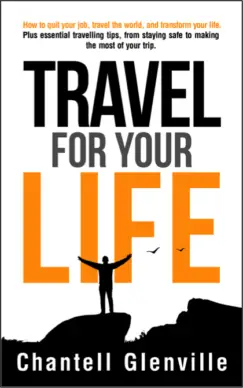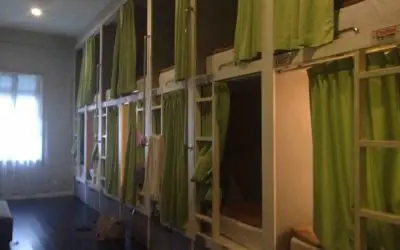So if you’re looking to travel on a budget while still ensuring a fulfilling journey and memorable destinations this one’s for you.
10 Budget Travelling Tips to See the World
Off Peak Travel | Free Attractions | Pack Light | Use Comparison Sites | Choose Local |
Public Transport | Street Food | Group | Points | Insurance
1. Embrace Off Peak Travel
Harder to do with a full time job but if you’re able to when planning your travel, whether it long-terms or holidays from work, try to plan it around off-peak seasons for the destinations you’re going to. Travelling during off-peak season as not only will it save you money but it comes with other perks too. Travelling off-peaks means:
Fewer Crowds
One of the advantages of off-peak travel is that you can avoid crowds and longer lines as people are not keen to travel during those times. Skip the queues and crowds to maximize a peaceful and enjoyable travel experience. Also some destinations can be more enjoyable to travel to such a Bali. Whist off-peak season for Bali is rainy season, what comes with that is not only less crowds, but a nice bit of refreshing balance when the rain cools things down. Plus if you haven’t spent a lot of time in tropical locations watching the Bali rain is something in and of itself to experience.
Cheaper Airfare
During non-peak times, airlines offer a variety of discounts and promotions in order to fill their seats. If you can be flexible on the exact dates you’re travelling during off-peak season even better. What I do for this is put the whole month into SkyScanner for the destination I want tot travel and then see which weeks and days come up cheapest.
*Expert hack, you can also try flying to another nearby airport and then taking a short flight or public transport to your final destination. Sometimes this can reduce costs by as much as 50%. I used to fly in and out of Singapore from Bali for this reason.
Discounts in Accommodation
Hotels and hostels usually al have lower rates in off-peak seasons. You can see it massively in London where I’ve stayed in hotels off peak that were £50 a night, then when it gets to peak-season or a popular event they go up to almost £500 a night. For the same room, in the same hotel!
In Asia, where bargaining is expected in a lot of countries, during off-peak season you may also get some great discounts by booking 1 night for when you arrive and then asking directly at the accommodation you want to stay at what the best deal they could do for you is to spend the rest of your stay there. That’s what I did my first month in Kuta in Bali.
2. Embrace Free Attractions
Find destinations that have lots of free, or cheap attractions, to explore.
Cultural and Natural Heritage
Indulge yourself in places that offer natural beauty and cultural heritage. Local parks and public events can offer a deep dive into the region’s history without hurting your pocket. While you’re exploring, make sure that you capture the scenic beauty and vibrant events using tools like the Matrice 30T drone for memorable aerial shots. I’ve particularity always loved Barcelona for this as just walking round the parks and city feels like a tourist attraction in itself and costs nothing.
Historical Museums
There are certain days when historical museums offer their entrance for free or at a reasonable price. This educational itinerary can give you insights into the city’s history, art, and architecture. Immense yourself with this activity will not only save your wallet but also enrich your knowledge of the location’s way of living from the past to the present.
3. Limit Baggage Fees with Smart Packing
If you want to travel on a budget, it is essential to learn the skill of light packing. Prioritising essentials when packing is a minimalist approach and can help avoid additional luggage fees. This is especially important to bear in mind if travelling Europe where a lot of the airlines charge to take any luggage larger than a handbag even it it will be going on board with you. Plus packing light has other benefits too:
Move Freely
Traveling light not only saves you money but also rewards you to move freely and effortlessly. Reduced baggage means less hassle and can simplify your travel by making it easier to move around airports, train stations, and bustling city streets. It can save you time waiting for luggage when getting off flights (or the worry of your luggage getting lost) plus if you’re backpacking means you’ll be able to life your luggage more easily yourself on and off busy local busses or boards. Furthermore, the fewer items you need to keep an eye on, the lower the risk of misplacing or forgetting your things.
4. Compare Before Booking
Another essential thing to take note of is to compare different options before finalising your travel arrangements.
Research Thoroughly
You can save money by dedicating your time and effort to investigating various travel options that have hidden deals and discounts. Make sure to gather well-informed information by using different but trustful resources.
Use Comparison Platforms
Kayak and Skyscanner are one of the best comparison platforms that you can use. These tools gather data from different sources, which makes them present a comprehensive review, allowing travelers to assess their options and secure the best deals available.
5. Opt for Local Rather than Luxury
There is no harm in choosing luxury, but opting for local over luxury will not only save you money but can make your trip all the more enjoyable too as you get a better sense of the real country you’re in and its culture.
Cost-Effective Lodging
Choosing locally-owned establishments like bed and breakfasts or hostels presents budget-friendly alternatives compared to luxurious hotels and often results in significant savings. Don’t worry as there are accommodations that although economical, they still offer a cozy and comfortable space that makes a traveler’s stay pleasant and memorable.
Authentic Cultural Experiences
You can experience insights into the region’s culture, tradition, and invaluable and genuine connections by staying in local accommodations. As a traveler, you can catch a unique glimpse into the daily lives of local residents.
6. Public Transport
Using public transportation is one of the most effective and efficient ways for every budget traveler. Local public transportation offers efficiency and often covers expansive areas, so there’s no problem for every traveler to jump to their next destination. Transportation such as buses and trams are the most common wallet-friendly way to explore your following itinerary.
Book Longer Passes and See More
Opting for day or week-long options in transit passes can further enhance savings during your journey. Other than transportation, public transit also allows travelers to observe and engage with the daily routines of locals.
7. Explore Street Food and Local Eateries
A journey without tasting their local eateries and street food will make you regret it as soon as you leave the place. Make sure to enjoy it to the fullest without breaking the bank.
Culinary Experience on a Budget
Street food vendors and local eateries offer delectable yet affordable dishes that serve as a gateway to their region’s melting pot. Taste their national dishes or famous foods to fully embrace their culture and authenticity.
New Flavours and Dishes
Travellers can immerse themselves in a rich and unfiltered taste of the traditional cuisines. Take note that there are generous locals so don’t forget to bid your “thank you” as they sometimes offer their food for free or at low prices for tourists who love their dishes.
8. Travel in a Group
Opting for group travel has its share of benefits. From accommodation to transportation, shared expenses with a group often lead to substantial savings as costs are distributed among participants.
Creates Bonds and Shared Experiences
Traveling together fosters shared experiences, memories, and camaraderie that can last a lifetime. Aside from its economic benefits, group trips also create opportunities for forging deeper connections with each other.
9. Strategically Use Reward Points
Points and Rewards are a best friend to everyone who is on a tight budget. People in the US seem to have much better options of credit cards that get good airline points than those of us in the UK. The best I’ve found in the UK is Amex, although the card that gives you the greatest flexibility for this comes with a yearly fee. That said alongside that yearly fee it also comes with unlimited lounge access and free travel insurance. I put all the spending I can on it and pay it off every months so I get the most points possible.
10. Get Good Travel Insurance
Having travel insurance that can cover unforeseen risks ensures an additional layer of protection against financial loss meaning you don’t spend all of your future travel budget on one unfortunate accident of illness.
Shield for Uncertainties
From unexpected medical emergencies to sudden cancellations, having travel insurance provides a safety net against unpredictable events that can disrupt a trip. Prioritising things like this ensures a peaceful mind on the traveler’s part.
It could also save your life as in some places in the world they won’t treat you unless you can pay up front or give your travel insurance details.
What are your top budget travelling tips? Let us know in the comments below
Related Posts
How not to be a d**k in hostel dorm rooms
I’m writing this having been awake since 3am courtesy of some douchbags in my hostel dorm room I’ve thought about writing about how not to be a d**k in hostel dorm rooms before since it’s a concept an irritatingly large number of people seem to struggle...
How To Travel on a Budget – Keeping Track on The Road
How to travel on a budget is as much about how much you save before you leave for your trip as it is how you keep track of your money whilst on the road. There's not point saving up loads of money then just to go around makin' it rain everywhere you go.There are a...
How to Save Money to Travel
Having been away since quitting my job in 2014 by far the most frequent comment I get isn't how to save money to travel, it's "Oh, I wish I could afford to travel". Or sometimes, on the slightly more scathing end of the spectrum, "Well you must just really...








0 Comments